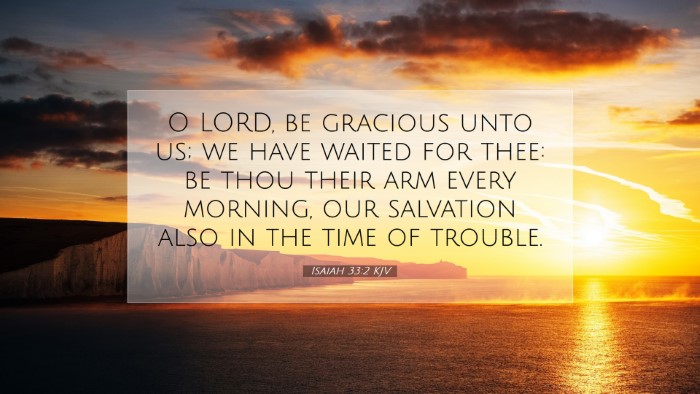Commentary on Isaiah 33:2
Verse Context: Isaiah 33:2 states, "O Lord, be gracious to us; we wait for you. Be our arm every morning, our salvation in the time of trouble." This prayerful cry showcases a profound dependence on God as the source of salvation and strength.
Exegesis and Theological Insights
In this period of turmoil and impending judgment, Isaiah articulates a heartfelt request to God. This verse is both a supplication and an acknowledgment of God’s sovereignty. As church leaders, students, and scholars dissect this profound text, several key themes emerge:
- Graciousness of God: The appeal for grace underscores the essential nature of divine mercy. Henry notes that our approach to God must always be rooted in an acknowledgment of our need for His favor.
- Expectation of Salvation: The phrase "we wait for you" expresses confident expectation. Barnes highlights that waiting on the Lord is an act of faith, displaying trust in His timing and plan.
- God as Our Strength: The metaphor of God being “our arm” signifies support and protection. Clarke elaborates on this imagery, emphasizing that God’s strength is manifested daily as believers face life's challenges.
- Salvation in Troubling Times: The dire call “our salvation in the time of trouble” points towards a recurring biblical theme: God is present in our sufferings and difficulties. This awareness of God’s provision during crisis moments is vital for cultivating faith among congregations.
The Plea For Grace
Matthew Henry reflects on the deep need for God’s grace as it transforms human lives. The request for grace implies a recognition of our fallen state. It is through God's unmerited favor that we are enabled to endure hardships. The plea highlights a humility that recognizes our inadequacy.
An Active Waiting
The phrase “we wait for you” is an active posture of anticipation. Albert Barnes emphasizes that waiting on the Lord involves both patience and active trust. It is not a passive resignation but an engaged waiting that drives the believer to seek God earnestly in prayer and worship.
A Daily Sustaining Arm
God being described as “our arm every morning” illustrates His constant provision and support. Clarke posits that this imagery conveys not only strength but also readiness to assist in daily living. The repetitiveness of “every morning” suggests a continual dependency and trust in God’s daily sustenance.
Seeking Deliverance in Crisis
The acknowledgment of God as “our salvation in the time of trouble” highlights the urgency of divine intervention. Alluding to historical contexts, Henry explains that the threats faced by Israel at this time necessitated a profound reliance upon God. This component of the text serves as a reminder to contemporary readers of the importance of seeking God during life's storms.
Application for Modern Believers
For pastors and theologians, Isaiah 33:2 offers profound truths that can be woven into sermons and teachings. The insights can inspire congregants to invest time in prayerful waiting and to lean on God's strength during adversities.
- Embrace Dependence: The verse encourages believers to live in recognition of their dependence on God for every aspect of life.
- Active Prayer Life: Encourage practices that foster active waiting through prayer, Bible reading, and community support.
- Hope in Salvation: Teach that God is always present during crises, offering hope and salvation. This is especially relevant in discipleship and counseling contexts.
- Daily Renewal: Emphasize the importance of daily renewal in faith and strength through routines that prioritize God each morning.
Conclusion
The profound message encapsulated in Isaiah 33:2 resonates through the ages, calling believers to a deep reliance on God's grace, strength, and salvation. As discussed in the insights from Matthew Henry, Albert Barnes, and Adam Clarke, this verse serves as both a spiritual anchor and a guide for faithful living. The call to active prayerful waiting and the acknowledgment of God’s sustaining power are vital for nurturing a robust spiritual life.


